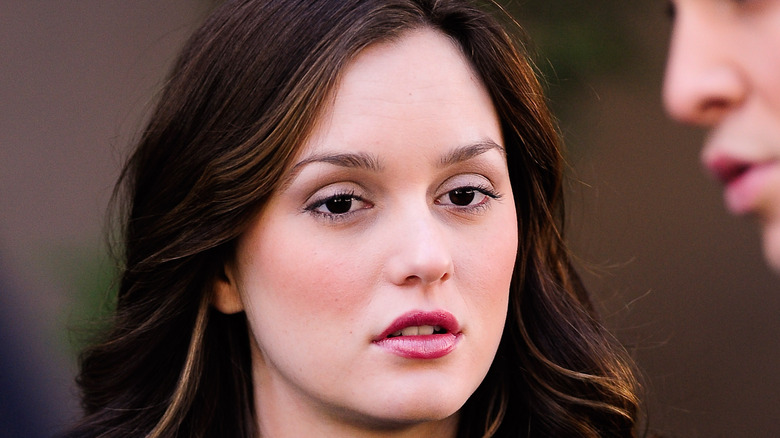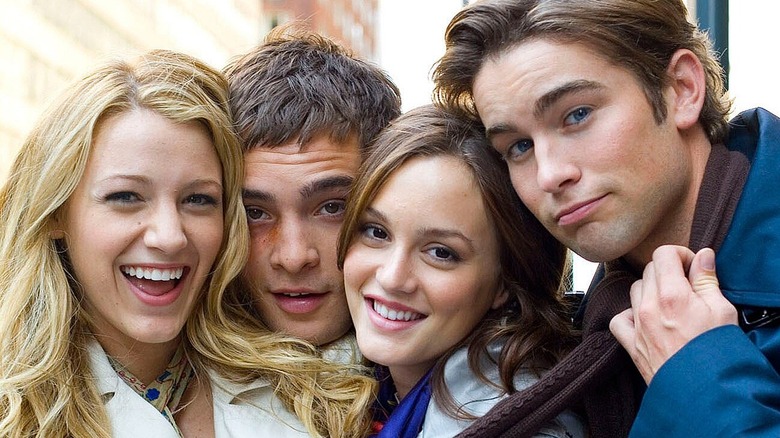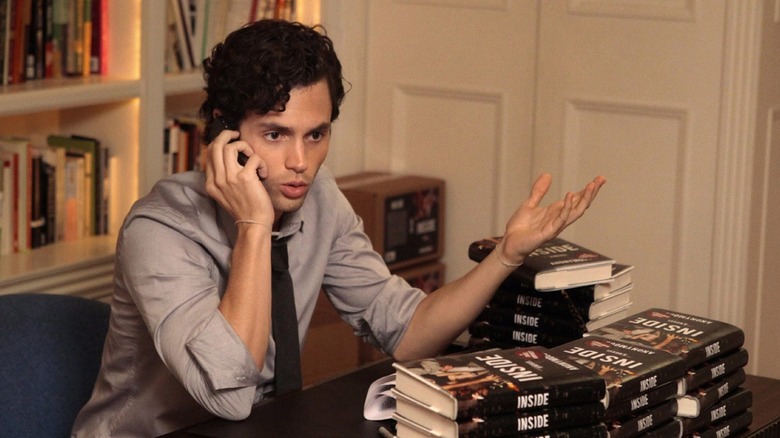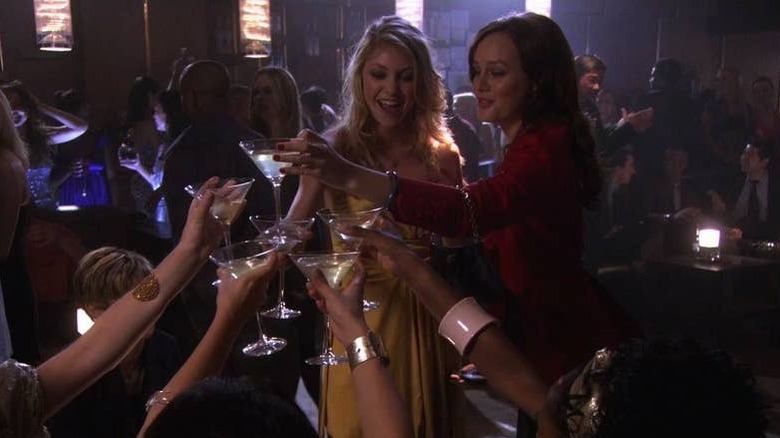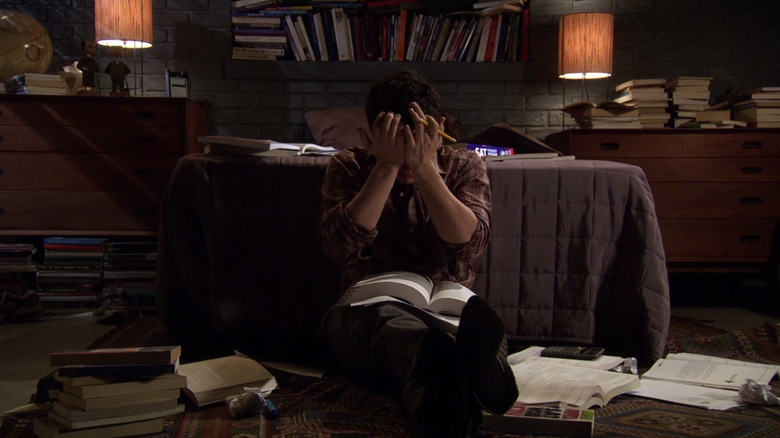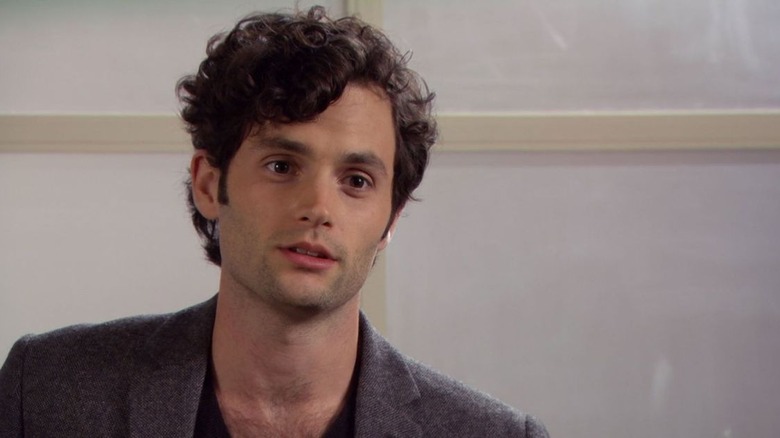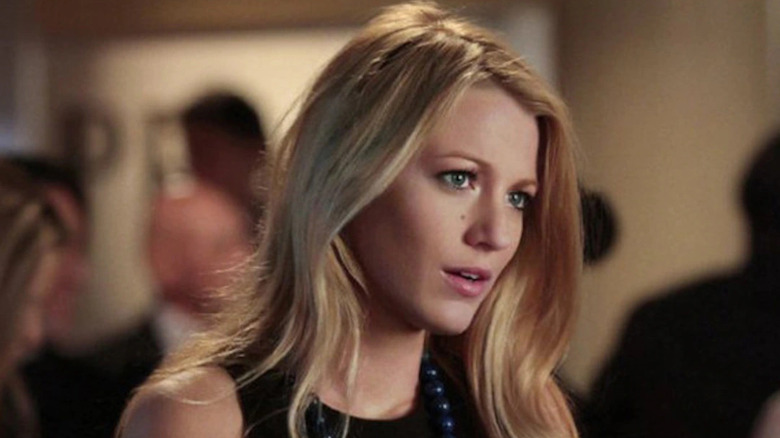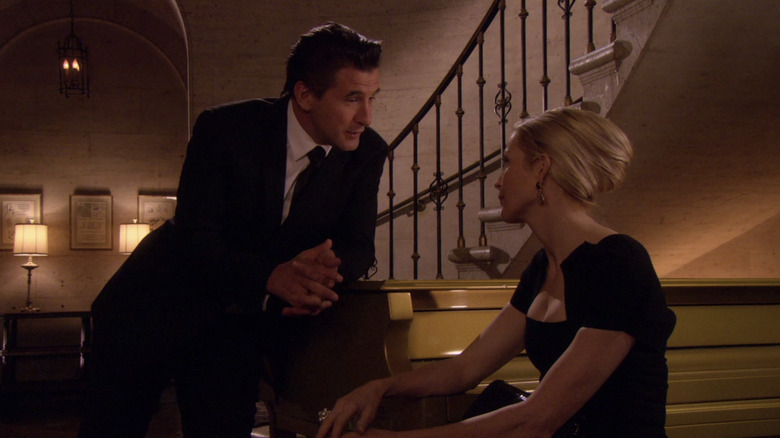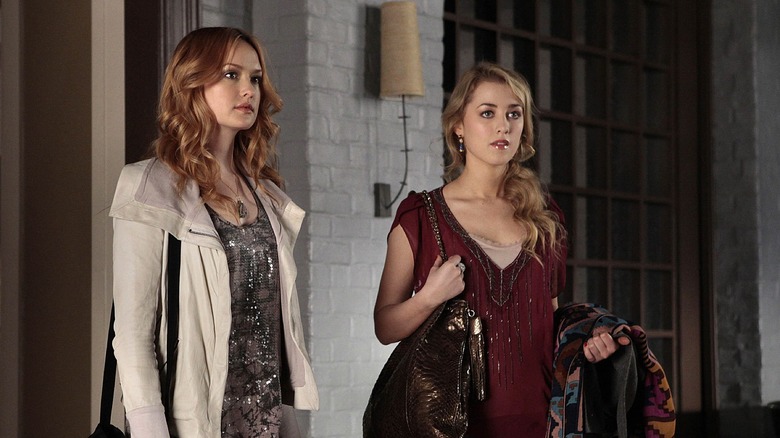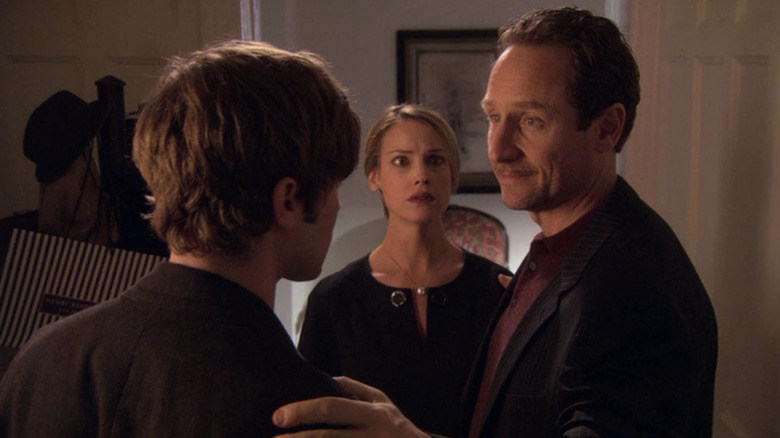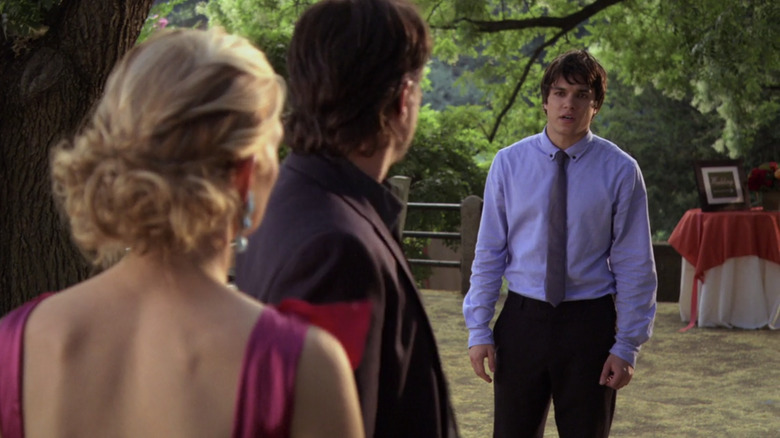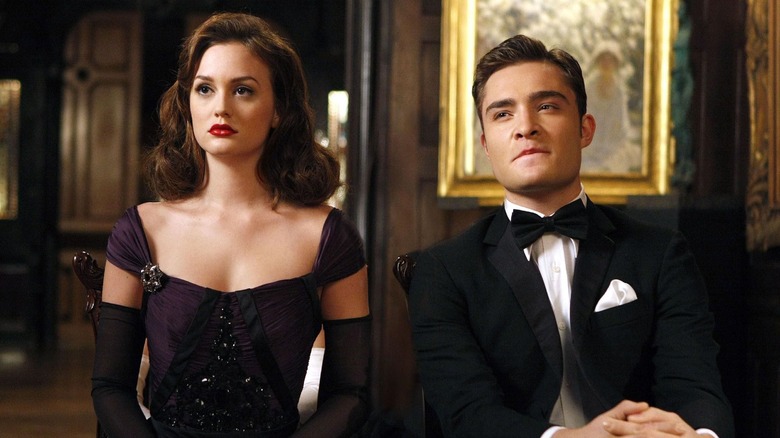Things In Gossip Girl You Only Notice As An Adult
From 2007 to 2012, Josh Schwartz sculpted an extravagant image of what life is like for Manhattan's Upper East Side elite in the CW show, "Gossip Girl." In the era of pre-iPhone technology, many viewers first experienced the complicated world of "Gossip Girl" as teenagers. To fans, Serena (Blake Lively), Blair (Leighton Meester), Chuck (Ed Westwick), Nate (Chace Crawford), and Dan (Penn Badgley) represented the many character archetypes present within Manhattan's elite. Whether the characters were navigating New York high society, cheating on their SATs, or faking their own deaths, the soap opera-esque storylines gave young, impressionable audiences a view of the high life that often resulted in unrealistic, overly-dramatic expectations.
Nearly a decade has passed since the series wrapped, and upon finding new life on streaming platforms and in a modern-era reboot, "Gossip Girl" has been reevaluated with the matured eyes of a now-grown generation. So let's take a look back at the show that put Blake Lively on the map, discussing the things in "Gossip Girl" that you only notice as an adult.
Lack of diversity
One aspect of the original "Gossip Girl" that many people can agree did not age well was a lack of diversity among the main cast members; every one of them was heterosexual and white. Like "Friends" and "Seinfeld," critics of the show pointed to its New York setting (in 2021, NYC was roughly 43% white, 24% Black, 14% Asian and 15% other) in saying such series were inaccurate portrayals at best, tone-deaf bordering on racist at worst.
On "Gossip Girl," there were sparse occurrences of diversity in secondary characters such as Vanessa Abrams (Jessica Szohr) or Eric van der Woodsen (Connor Paolo), but the show's creators admit now that they could have done better.
Appropriately enough, the series seems to be atoning for past mistakes. When Joshua Safran (executive producer on both the old and the new series) was helping orchestrate the 2021 "Gossip Girl" reboot series, he explained to Variety that he made it a priority to create a much more "diverse" universe, making particular room to tell queer stories. Whereas the original series felt very Edith Wharton-centric, the writers wanted to showcase an increased understanding of a broader-minded generation while fostering diversity among the cast members.
A teenager published in The New Yorker?
A major turning point in the series comes when Vanessa steals Dan's Upper East Side exposé, "Inside," and drops it right onto an editor's desk at The New Yorker, only for it to be published without a single round of edits. A teenager on their first viewing of "Gossip Girl" might not understand how absurd this is, but upon subsequent watches, it becomes clear that this is entirely implausible. Before even considering the legal complications that would result from someone's work being distributed without their approval, it seems virtually impossible that The New Yorker would care about some random high schooler's gossip story.
The New Yorker has been published since 1925; as of 2019 it had a circulation north of a million (much of it outside New York and even international), and in 2016 it earned the distinction of becoming the first magazine to win a Pulitzer Prize. It seems hard to believe that the unedited scribblings of a high schooler would meet the standards of their writing staff.
Similarly, when considering the repercussions of exposing the deepest, darkest secrets of the most powerful families in New York City (and in some ways, the world), is this something The New Yorker would really want to touch? Acknowledging the stretch in credulity, writers of the "Gossip Girl" reboot made a winking joke about it when the Constance/St. Jude teachers discovered the Gossip Girl blog for the first time. Among the many unbelievable revelations about the previous characters was that "a high school senior got a story published in The New Yorker."
Underage drinking
An important part of crafting the world of "Gossip Girl" is the night-life, more specifically the presence of alcohol in almost every situation. Perhaps those who watched the series as teens became accustomed to the constant flow of booze, but in the eyes of adults, the sheer prevalence of underage drinking that takes place in the series is problematic.
In this world, without needing so much as a fake ID, bartenders simply look the other way. Perhaps it's because these kids are members of such prominent families; conversely, shouldn't their notoriety make it harder for them to sneak a Manhattan on the sly?
Every character in the series seems to have no problem getting their drink on ... even those as young as 14-year-old Jenny Humphrey. While many "Gossip Girl" staples have been tweaked between the old and new series, this is one that remains. Martinis continue to be the drink of choice among the main characters, much like they once were for Blair and Serena. In that very first episode of "Gossip Girl," the frenemies were seen sipping martinis at the Palace (at the ripe age of 16), and all these years later they are still able to secure them as easily as a 7-Eleven Slurpee.
Nobody finished college
In Season 3, "Gossip Girl" seemed determined to prove that with all their money and connections, these characters didn't really need an education. A majority of the characters had been accepted into Ivy League universities; after a few seasons, however, their matriculation seemed to recede into the background of all the storylines. Dan even bailed on his writing workshop in Europe, with no real repercussions on his long-term prospects.
Columbia, Brown, Yale, and NYU are among the universities that these characters attended, but with the exception of Serena deciding to take a semester off to work as a publicist, the plot points offered little resolution. Nonetheless, Nate was able to work his way up to editor-in-chief of his own newspaper, Dan became a respected novelist, Blair became head of her mother's fashion brand, Chuck was the head of Bass Industries, and Serena became ... basically whatever job she wanted to have.
The Gossip Girl plot hole
For years, "Gossip Girl" provided audiences with an escape from their own lives. The idea of escapism was intrinsic to its unrealistic storylines — but when you re-watch those same episodes as an adult, they may seem to hinge not so much on suspension of disbelief as simply bad writing.
For example, if you re-watch the series with the knowledge that (spoiler alert) Dan is Gossip Girl, it often makes no sense at all. This is largely because, according to Safran, Nate (Chace Crawford) was intended to be Gossip Girl until his departure following Season 5.
Supposedly, the team had even considered another Gossip Guy ... er, Girl. "We worked hard to kind of lay in tiny seeds about it being Eric, and then the NY Post wrote an article saying that Gossip Girl was Eric so we were like, 'We gotta scratch that,'" Safran explained. "Then one of the writers realized that Nate had never sent a tip in to Gossip Girl ... which is when we're like, 'Oh, well then he's Gossip Girl.'"
Despite such breadcrumbs dropped in Season 5, laying the groundwork that Nate could be revealed as the culprit, this was abandoned for the sake of the surprise reveal.
Serena is kind of the worst
While viewers are led to believe that golden girl Serena van der Woodsen (Blake Lively) is the "hero" of this story, she's often just a terrible person.
The series opens up on Serena returning from boarding school, attempting to start fresh and leave all the negativity she has caused behind. But, "Gossip Girl" is far more complicated then the "good vs bad" simplicity that a younger viewer might want her storyline reduced to. As the "It Girl" of Constance Billard becomes the subject of Gossip Girl's slander, viewers are intended to root for Serena's success. This becomes complicated when her triumphs inevitably come at the expense of others, including her closest friends.
To name just a few of Serena's lowest moments: She stole Yale from Blair, sabotaged her own cousin's acting career, slept with her best friend's boyfriend (twice), deferred college for a year without telling her family, allowed her father to get away with giving her mother fake cancer and ... who could forget her hand in someone's drug overdose?
Actress Blake Lively has been outspoken in the year since about her dislike for the character that catapulted her to star status. In a 2015 interview, she admitted that portraying the party girl always felt a bit like "compromising" to her. "It's a weird thing when people feel like they know you really well, and they don't," she explained. "I would not be proud to be the person who gave someone the cocaine that made them overdose and then shot someone and slept with someone else's boyfriend."
Fake cancer
One of the most disturbing, enraging storylines of the original "Gossip Girl" was when William van der Woodsen (William Baldwin) gave his ex-wife and mother of his children fake cancer.
Depicted throughout the series as a well-respected doctor, in Season 3, the family learned that his ex-wife Lily (Kelly Rutherford) was suffering from the big C and William had been treating her secretly. But the catch was, she wasn't really sick. As it turned out, William was faking Lily's symptoms, making her believe she was sick and in need of his help, thereby creating a rift between her and husband Rufus (Matthew Settle).
Given the money and resources at Lily's disposal, it seems impossible to believe that she wouldn't — at the very least — solicit a second medical opinion from another doctor. You also have to consider the messenger — and Lily's diagnosis came directly from her calculating ex-husband, who had previously cheated on her with her own sister, resulting in a love child (Charlie).
Throughout the season, it was slowly revealed to everyone that Lily was never actually sick. But, instead of Serena holding her father accountable for such a dishonest act, she let him escape from the police on a private jet.
Viewing this storyline now, years later, as adult, it's hard to not feel like William should have been immediately stripped of his medical license and shunned from his family. Which makes things harder to take seriously when William reconciles with Lily at the end of the series.
The entire Charlie storyline
The saga of the Charlie Rhodes/Ivy Dickens storyline is one that spans multiple seasons. Serena's maternal aunt, Carol Rhodes (Sheila Kelley), began scheming to find a way to steal her daughter's inheritance from the family, deciding to employ an actress that she had worked with in the past to impersonate her daughter. This plan required Ivy Dickens (Kaylee DeFer) to craft complicated lies, while building relationships with the main cast and pretending to be a member of the family.
Adding to the many plot holes of "Gossip Girl" was that, in one instance, Serena recalled meeting Charlie once years before, but in another instance the real Charlie (aka Lola), played by Ella Rae Peck, insisted she has never met her extended family before. If this was true, and Serena had met her cousin once before, it seemed difficult to believe that she would have forgotten what she looks like and would be able to accept a total stranger as her cousin.
Similarly, with the cast's obsession with the internet, wouldn't someone have looked up Charlie Rhodes and easily found photos of the real one? As impressionable young viewers back in the 2010s, the ridiculousness of this might not have been much of a sticking point. But now, as grown adults binging the series once again, perhaps this storyline is a particular nuisance.
Young professionals
When people are young, many want to be older; when people are older, many want to be young again. This is true for the Upper East Siders of "Gossip Girls," as they live like adults: running billion-dollar corporations, jetting off to Paris when the mood strikes, going on designer shopping sprees, and creating their own empires. For the sake of the extravagant storylines, writers focused on creating a world where these teens could thrive like adults and experience everything wealth had to offer, without the constraints of age.
Most young, first-time viewers likely did not feel the need to question the grown-up attitudes of these supposed high schoolers, likely due to how pervasive the conceit was in mainstream television at the time — indeed, the characters of "The OC," "90210," "Dawson's Creek" and other shows all seemed to have the looks of youth and the lifestyle of someone twice their age.
Along with acting all grown up, the Upper East Side characters showcased their maturity in their wardrobe choices. In fact, Vogue wrote an editor's guide to the fashion of "Gossip Girl," breaking down designers and prices for many of the iconic outfits seen throughout the show. In reality, you would have an extremely hard time finding anyone of their age wearing such an outfit.
Absent parents
While it might seem fun to envision a world with no parental supervision, "Gossip Girl" takes it to a whole new level. Upon watching "Gossip Girl" prior to adulthood, the absence of our Upper East Side prep-students' parents simply meant that the kids were able to navigate life like adults, free to attend high-end parties, skip school, and travel whenever they wanted. Not since "Peanuts" had adults been so rarely glimpsed and insignificant to the plotlines.
Not only would these parents disappear to leave their children to fend for themselves, but many of them actually spent a lot of their own time behind bars. For example, in the Season 2 episode "Chuck in Real Life," Dan discovered that most of Nate's family possessions had been seized during an FBI investigation, leaving Nate with only a sleeping bag and an empty house with no electricity or water; his mother was nowhere to be found.
There are many other instances of child neglect throughout the series as well, including Serena's dad rejecting a relationship with her after she tracks him down, Dan and Jenny's mom only appearing for one season before disappearing, Chuck's dad faking his own death, Chuck's mom faking her own death, Chuck's dad attempting Chuck's death (poor Chuck). This doesn't even taken into consideration the general absence of the parents for so many of the kids' major life events. Sure, the wealthy and well-to-do aren't always known for being the best parents; nevertheless, through the eyes of an adult, this facet of "Gossip Girl" is downright depressing — especially because these teenagers could really benefit from some guidance.
Long lost brother
What is a soap opera without a long-lost sibling? In Season 2, Rufus discovers that he and Lily conceived a child he never knew existed, who was subsequently given up for adoption.
After unsuccessfully searching all over Boston for his son, the audience met Scott (Christopher Riggi), who tracked down his father and formed a bond over their shared love of music. Clearly, Scott wanted to have a relationship with his biological parents, back together after so many years. However, Scott last appeared in the series in "Rufus Getting Married" (Season 3, Episode 5), having only appeared in five episodes total.
One would expect the love child of Rufus and Lily to have a more prominent role in "Gossip Girl," but although it was set up as a seemingly significant storyline, Scott's relationship with his biological parents would never be explored any further. When younger viewers watch the original "Gossip Girl," they likely won't mind; after all, disturbing the small bubble of main characters driving the series could put it on a sidetrack that might not be nearly as interesting.
Understandably, viewers found it quite difficult to root for Dan and Serena's relationship knowing they share a sibling. Nonetheless, this aspect of the show would remain a point of contention among audience members and, for the sake of continuity, became the subject of many lingering questions.
Unhealthy relationships
Another aspect of "Gossip Girl" that young fans might not have given much thought to upon first watch was the turbulent relationships present throughout the entire series. For instance, many viewers couldn't help but root for Chuck and Blair's relationship — even after all the toxic, borderline-psychopathic behavior they displayed — when any exploration of the evidence can draw no other conclusion but that these two people needed to get far, far away from each other.
Whether it was their first romantic interactions (taking place when Blair was dating Chuck's best friend), inflicting public humiliation on each other via Gossip Girl, or Chuck trading Blair for a hotel, the list of their mistreatment for one another went on and on.
Similarly to Chuck and Blair, there were other unhealthy relationships on display, both romantic and platonic. The rocky friendship between Serena and Blair, for instance, was at the forefront of the series, with the frenemies being supportive one moment and plotting to destroy each other the next. "Gossip Girl" also seemed to expect its audience to "root" for Rufus and Lily, Blair and Louis (Hugo Becker), Nate and Blair, and whoever Serena dated throughout the show. But ultimately, this just turned the viewer into a proponent of unhealthy relationships — and at worst, taught younger generations to accept such behavior in their own lives from potential dating partners.
